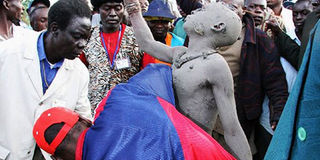Male ‘cut’ boosts drive against Aids: report

Circumcisers perform the cut on an initiate, smeared with mud in Bungoma South District, western Kenya. Photo/FILE
What you need to know:
Expertise taken to Swaziland
- Last month, a Kenyan medical team offered to support Swaziland’s male circumcision programme.
- Six nurses from the Nyanza Reproductive Health Society spent 25 days in the southern African country helping to provide medical male circumcision for HIV prevention to 406 clients at three major district hospitals.
- The nurses worked with three doctors from Ethiopia.
- Trials show that circumcision reduces a man’s chances of infection from a female partner by about 60 per cent.
A multi-universities study shows a 66 per cent reduced risk of HIV infection among circumcised men compared to uncircumcised ones.
The study, by researchers from the Universities of Nairobi, Illinois and Manitoba (UNIM) was presented after four-and-a-half years of follow-up at the International Aids Conference in Vienna, Austria.
Chances of infection
According to the Male Circumcision Consortium newsletter, the researchers followed about 1,500 men who took part in a randomised controlled trial — a scientific experiment commonly used in testing the effectiveness of healthcare services — of male circumcision conducted in Kisumu.
That trial, and similar ones in South Africa and Uganda, showed that circumcision reduced chances of infection from a female partner by about 60 per cent.
“In the follow-up study, we found that this protective effect is clearly sustained, and possibly even strengthened, over time,” said principal investigator Robert Bailey of the University of Illinois at Chicago.
The three randomised trials were stopped early after 18 to 24 months when it became clear that circumcision offered significant protection against HIV infection, but left open the question whether that protective effect is sustained over time.
Prof Bailey and his colleagues conducted the follow-up study to find out whether male circumcision offered long-term protection in 54 months.




